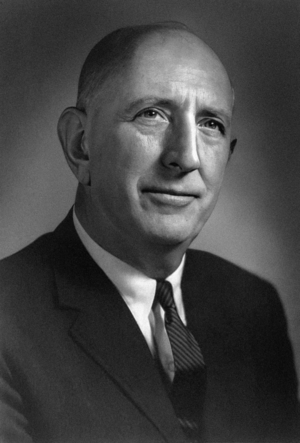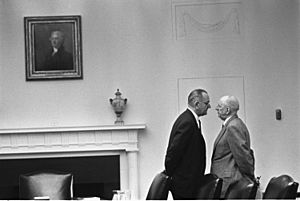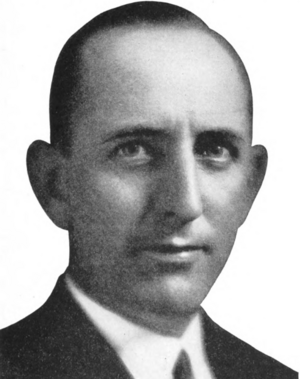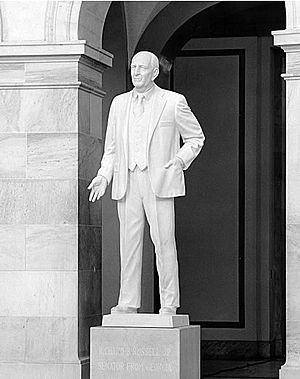Richard Russell Jr. facts for kids
Quick facts for kids
Richard Russell Jr.
|
|
|---|---|
 |
|
| President pro tempore of the United States Senate | |
| In office January 3, 1969 – January 21, 1971 |
|
| Preceded by | Carl Hayden |
| Succeeded by | Allen J. Ellender |
| Chair of the Senate Committee on Appropriations | |
| In office January 3, 1969 – January 21, 1971 |
|
| Leader | Mike Mansfield |
| Preceded by | Carl Hayden |
| Succeeded by | Allen Ellender |
| Chair of the Senate Committee on Armed Services | |
| In office January 3, 1955 – January 3, 1969 |
|
| Leader | |
| Preceded by | Leverett Saltonstall |
| Succeeded by | John C. Stennis |
| In office January 3, 1951 – January 3, 1953 |
|
| Leader | Ernest McFarland |
| Preceded by | Millard Tydings |
| Succeeded by | Leverett Saltonstall |
| United States Senator from Georgia |
|
| In office January 12, 1933 – January 21, 1971 |
|
| Preceded by | John S. Cohen |
| Succeeded by | David H. Gambrell |
| 66th Governor of Georgia | |
| In office June 27, 1931 – January 10, 1933 |
|
| Preceded by | Lamartine Griffin Hardman |
| Succeeded by | Eugene Talmadge |
| Member of the Georgia House of Representatives | |
| In office 1921–1931 |
|
| Personal details | |
| Born |
Richard Brevard Russell Jr.
November 2, 1897 Winder, Georgia, U.S. |
| Died | January 21, 1971 (aged 73) Washington, D.C., U.S. |
| Political party | Democratic |
| Parents |
|
| Relatives | Robert Lee Russell (brother) |
| Alma mater |
|
| Profession | Attorney |
| Military service | |
| Allegiance | |
| Branch/service | |
| Unit | Reserves |
| Battles/wars | World War I |
Richard Brevard Russell Jr. (born November 2, 1897 – died January 21, 1971) was an important American politician. He was a member of the Democratic Party. He served as the 66th Governor of Georgia from 1931 to 1933. After that, he spent almost 40 years in the United States Senate, from 1933 until his death in 1971.
Russell was a key leader of a group called the conservative coalition in Congress. This group was powerful from 1937 to 1963. By the time he died, he was the longest-serving member of the Senate. For many years, he led the Southern politicians who opposed the civil rights movement.
Born in Winder, Georgia, Russell became a lawyer after studying at the University of Georgia School of Law. He worked in the Georgia House of Representatives from 1921 to 1931. Then he became the Governor of Georgia. In 1933, he won a special election to become a U.S. Senator.
Early in his Senate career, he supported President Franklin D. Roosevelt's New Deal programs. However, he also helped create the conservative coalition. He was the main person behind the National School Lunch Act. This law helped provide free or low-cost school lunches to students who needed them.
During his long time in the Senate, Russell chaired several important committees. He was the chairman of the Senate Committee on Armed Services for most of the years between 1951 and 1969. He also ran for President of the United States in 1948 and 1952. He was a member of the Warren Commission, which investigated the assassination of President John F. Kennedy.
Russell supported racial segregation. He helped write the Southern Manifesto with Strom Thurmond. This document opposed racial integration. Russell and other Southern Senators used a tactic called the filibuster to block civil rights laws. Even after his friend, President Lyndon B. Johnson, signed the Civil Rights Act of 1964, Russell led a boycott of the 1964 Democratic National Convention. Russell served in the Senate until he passed away in 1971.
Contents
Early Life and Education
Richard B. Russell Jr. was born in 1897. He was the first son of Richard B. Russell Sr., who was a Chief Justice of the Georgia Supreme Court. Richard Jr. had many siblings.
His father tried several times to get higher political jobs. Even though his father was a well-liked state representative, he didn't succeed in becoming a U.S. Senator or Governor.
From a young age, Richard Jr.'s father prepared him for a career in politics. Russell spent a lot of his youth studying history. He learned about the American Civil War, Ancient Rome, and Classical Greece.
Russell went to the University of Georgia School of Law in 1915. He earned his law degree in 1918. While there, he was part of the Phi Kappa Literary Society.
At that time, white conservative Democrats controlled Georgia's government. The Republican Party was not strong in the state. This was partly because most African Americans could not vote. A constitutional change in 1908 made it harder for them to vote.
Starting a Political Career
After college, Russell worked briefly at a law firm with his father. Soon after, he successfully ran for the Georgia House of Representatives. He was elected at the first chance he got.
Six years later, at age 29, Russell became the Speaker of the House without anyone running against him. He was popular among other lawmakers. This was because people saw him as honest and good at working with others.
Governor of Georgia: 1931–1933
As governor, Russell made changes to the state government. He worked to help Georgia's economy grow during the Great Depression. He also made sure the state's budget was balanced.
During his time as governor, a book called I Am a Fugitive from a Georgia Chain Gang! became very popular. It was written by a World War I veteran named Robert Elliot Burns. The book described the harsh conditions in Georgia's prison system.
After the book and a movie based on it came out, Russell tried to have Burns sent back to Georgia to finish his sentence. Russell said that the book's descriptions were unfair to Georgia.
Serving in the U.S. Senate: 1933–1971
Russell first supported President Franklin D. Roosevelt's New Deal programs. These programs aimed to help the country recover from the Great Depression. In 1936, he ran for the U.S. Senate against former Governor Eugene Talmadge. Russell won by defending the New Deal. He argued it was good for Georgia.

During World War II, Russell believed that the United States should be very firm with Japan. He thought Japan should not be treated more leniently than Germany.
Russell helped first-term senator Lyndon B. Johnson become Senate Majority Leader. Russell and Johnson were close friends for many years. However, their friendship ended during Johnson's presidency. They disagreed over Johnson's choice for Chief Justice of the Supreme Court.
In 1956, Russell's office was a meeting place for Southern senators. They were unhappy with the Brown v. Board of Education ruling. This 1954 Supreme Court decision said that segregation in public schools was against the law.
In May 1961, President John F. Kennedy asked Russell to place a wreath at the Tomb of the Unknowns. This was part of a Memorial Day ceremony at Arlington National Cemetery.
In February 1963, Russell's Senate Armed Services Committee met with Defense Secretary Robert McNamara. They discussed policies in the Caribbean. Russell believed that American pilots would shoot down foreign jets in international waters if needed.
In January 1964, President Johnson gave his 1964 State of the Union Address. He asked Congress to pass laws against discrimination. Russell stated that Southern senators would oppose such a law. He called it "shortsighted and disastrous." He believed it would mix races, take away states' rights, and harm the system of checks and balances.
Russell and Johnson had different views on civil rights. Johnson supported civil rights as President. But Russell, who supported segregation, often used the filibuster to block civil rights laws.
Russell was a key figure for decades in stopping important civil rights laws. These laws aimed to protect African Americans from unfair treatment. After Johnson signed the Civil Rights Act of 1964, Russell and other Southern Senators boycotted the 1964 Democratic National Convention.
From 1963 to 1964, Russell was a member of the Warren Commission. This group investigated the assassination of President John F. Kennedy in November 1963. Russell had concerns about some parts of the Commission's findings.
Russell strongly supported a powerful national defense. As chairman of the Senate Armed Services Committee and later the Senate Appropriations Committee, he helped bring defense facilities and jobs to Georgia. He was cautious about the Vietnam War. He privately warned President Johnson many times against getting too deeply involved.
Russell's Legacy
Richard Russell was seen as a hero by many in the Jim Crow South. He was a very skilled and influential politician. However, his legacy is complicated by his lifelong support of white supremacy and racial segregation.
Russell publicly stated that he believed America was "a white man’s country" and that he was against "political and social equality with the Negro." He also supported poll taxes in the South. These taxes made it harder for African Americans to vote. He criticized President Truman's support for civil rights.
Many places and things have been named after Richard Russell. These include:
- The Russell Senate Office Building, one of the U.S. Senate office buildings.
- The Richard B. Russell Special Collections Building at the University of Georgia.
- Russell Hall, a dormitory at the University of Georgia.
- The Russell Auditorium at Georgia College and State University.
- Richard B. Russell Dam and Lake on the Savannah River. A state park is also named after him.
- The Richard B. Russell Airport in Rome, Georgia.
- The USS Richard B. Russell (SSN-687), a Sturgeon-class attack submarine.
- Richard B. Russell Highway and Parkway.
- Richard B. Russell Middle School in Winder, Georgia.
In 2020, a group was asked to review the names of buildings in the USG. This group suggested renaming buildings associated with Russell. However, the Georgia Board of Regents decided not to change any of the names.
 | Claudette Colvin |
 | Myrlie Evers-Williams |
 | Alberta Odell Jones |



